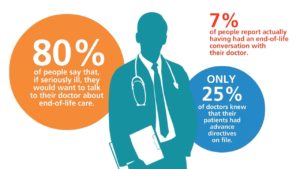People generally enjoy talking to others about a variety of topics however, terminal illness and end of life care are not in those enjoyable topics.
But why don’t we normalize talking about these things?
Who should initiate conversations around end of life care and terminal illness?
The patient? Their family? Their physician?
Talking about a loved one’s wishes for end of life care should be a normal thing! Don’t you want to know the kind of care your loved one wants to receive? What if you were unable to speak for yourself? Would you want your loved ones to know the kind of care you desire to receive?
When discussing end of life care and/or terminal illnesses, a person should not depend on his/her physician to initiate these conversations. Talking about end of life decisions is really hard, but not talking about your end of life choices and expecting your physician and family to know is much more difficult.

So think about this, if 80% of people want to talk to their doctor about end of life care, if seriously ill, but only 7% of patients actually have these conversations with their physicians, what is happening?
This is where St. Anthony’s can help!
Start by thinking about these questions:
What is more important to you when faced with serious illness- quality of life or quantity of life?
Where do you want to be when you pass- in a hospital with cords, tubes, ventilation, etc. or at home with loved ones and pets in a familiar environment?
Do you have advance directives in place to help your loved ones if you are unable to make your own decisions?
If you choose quality of life and to be at home during your final months, weeks, or days, we can help! Whether you have advance directives in place or not, our hospice or palliative program can help you obtain optimal quality of life. If you do not have advance directives in place, we have social workers who can help you get those documents set up and understand what they are saying.
St. Anthony’s Hospice and Palliative Care programs are in place to help you! Not only do we help patients achieve optimal quality of life, but we also educate the patient and family on the disease progression and how to have those difficult conversations with family.
Don’t depend on someone else to initiate this conversation, start it yourself! If your or a loved one needs help with a serious illness and/or end of life care, please call us at (270) 826-2326.
